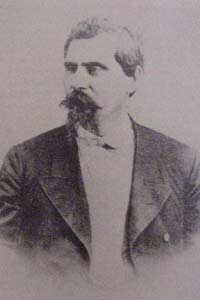Rollin Ridge
| John Rollin Ridge | |
|---|---|

John Rollin Ridge
|
|
| Born |
Chee-squa-ta-law-ny (Yellow Bird) March 19, 1827 New Echota, Cherokee Nation (now Georgia) |
| Died | October 5, 1867 (aged 40) Grass Valley, California |
| Cause of death | encephalitis lethargia ("Brain fever") |
| Resting place | Grass Valley, California |
| Nationality | American |
| Other names | Chee-squa-ta-law-ny (Yellow Bird) |
| Citizenship | United States |
| Occupation | Novelist, newspaperman |
| Spouse(s) | Elizabeth Wilson |
| Parent(s) | John Ridge Sarah Bird Northrup |
| Signature | |
John Rollin Ridge (Cherokee name: Cheesquatalawny, or Yellow Bird, March 19, 1827 – October 5, 1867), a member of the Cherokee Nation, is considered the first Native American novelist.
Born in New Echota, Georgia, he was the son of John Ridge, and the grandson of Major Ridge, both of whom were signatories to the Treaty of New Echota, which Congress affirmed in early 1836, ceding Cherokee lands east of the Mississippi River and ultimately leading to the Trail of Tears. At the age of 12, Ridge witnessed his father's death at the hands of supporters of Cherokee leader John Ross, who had vehemently opposed the treaty. His mother, Sarah Bird Northrup (a white woman), took him and fled to Fayetteville, Arkansas. In 1843, he was sent to the Great Barrington School in Great Barrington, Massachusetts for two years, after which he returned to Fayetteville to study law. It was during this period that his first known writing appeared in print. He published a poem, "To a Thunder Cloud," in the Arkansas State Gazette. He married Elizabeth Wilson, a white woman, in 1847. They had one daughter, Alice, in 1848.
In 1849, he killed Ross sympathizer David Kell, whom he thought had been involved with his father's assassination, over a horse dispute. Despite having a good argument for self-defense, he fled to Missouri to avoid prosecution. The next year, he joined in the California Gold Rush, but disliked being a miner. While there, he was reunited with his wife and daughter.
...
Wikipedia
